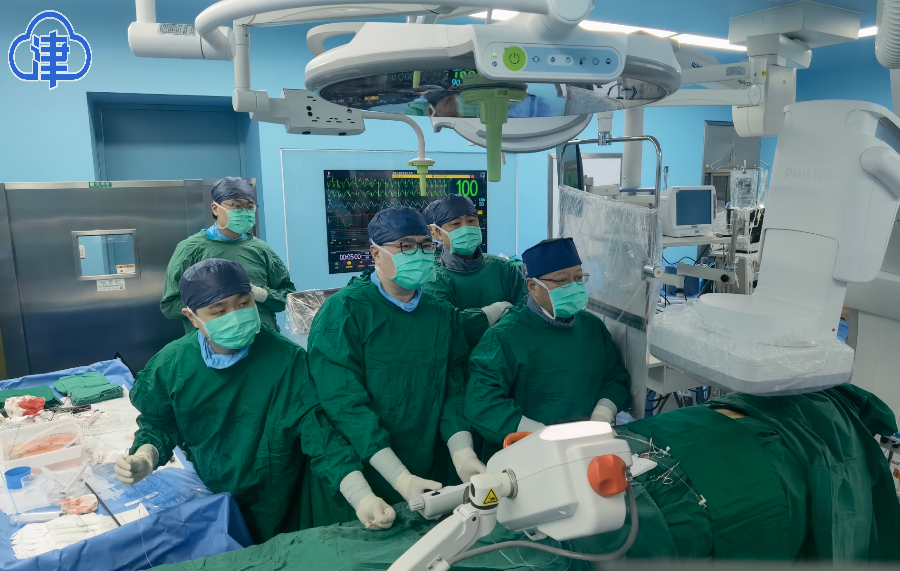Recently, two patients in their 70s with severe aortic valve stenosis underwent surgery by cardiac surgeons from Tianjin Chest Hospital and successfully completed valve replacement without opening the chest. Due to the small trauma, the patients recovered very quickly after the operation and could move freely in the ward one to two days after the operation. In recent times, 73-year-old Ding Da Niang found himself after a slight activity or walking will be chest tightness and breathlessness, unable to live a normal life, accompanied by family members to the Tianjin Chest Hospital Heping Hospital outpatient clinic for examination, heart ultrasound suggests that its aortic severe valve stenosis, resulting in blood suffocated in the heart can not be normally supplied to the brain and the whole body organs blood supply. Chen Qingliang, chief physician of cardiac macrovascular surgery at Tianjin Chest Hospital, told reporters, “The one-year sudden death rate of such patients reaches 50%, and the traditional treatment method must open the chest to replace the aortic valve.” After examination, Ding Da Niang in addition to valve disease also suffers from severe hypertension, coronary heart disease, especially combined with serious lung disease can not tolerate traditional open heart surgery. Director Chen Qingliang introduced: “Our team carried out a perfect examination and detailed analysis of the anatomical structure of the Ding Danniang, taking into account the aortic valve for the two-leaf valve, the valve ring is small, transverse to the heart, leaflet thickening redundant heavy calcification, there is a greater risk of coronary obstruction caused by acute infarction. Therefore, consider the implementation of transcatheter aortic valve replacement (without open-chest valve replacement).” Under the guidance of Jiang Nan, Director of Cardiac Surgery at the Chest Hospital, the No. 23 VenusA valve was successfully implanted in the hybridization operating room via the femoral artery (7-mm puncture port) for Din Da Niang, and the stenosis was immediately lifted, with Din Da Niang awake on the same day to remove the tracheal tube, and has now been transferred back to the general ward for free activities on the ground. By coincidence, 71-year-old Wu Danniang had been suffering from chest tightness and breathlessness for more than four months, and her symptoms worsened in the last two weeks. Systematic examination found that Wu Da Niang has a history of old myocardial infarction, hypertension, diabetes mellitus, coronary implantation of three stents four months ago, heart failure. The same functional bileaflet valve with minimal space in the sinus easily affects the coronary artery causing infarction. Dr. Jiang Nan and Dr. Chen Qingliang carefully designed a small balloon to dilate the stenotic valve and then implanted a 23 Venus valve. The operation went smoothly and the patient returned to the general ward two days after the operation and was able to move freely on the floor. In one day, we successfully performed transcatheter aortic valve replacement for two elderly and high-risk patients with severe aortic stenosis, and both patients returned to the ward smoothly after the operation. Director Chen Qingliang said that Heping Hospital of Chest Hospital, as a project of National Development and Reform Commission to improve the diagnosis and treatment capacity of difficult diseases, is equipped with the most advanced international medical equipment, which not only has the conventional catheterization room, but also has two intelligent and high-end hybridization operating rooms, which are mainly used for the interventional treatment of complex valvular diseases, hybridization surgery for aortic aneurysm, coronary hybridization, cardio-cerebral homoeopathy and other cutting-edge cardiac surgical procedures, which can provide the interventional treatment and hybridization surgery treatment for the patients with severe and difficult cardiac disease, and provide the patients with the best medical equipment. Interventional therapy and hybridization surgery treatment provides the highest quality hardware services. “Both cases are high-risk patients for traditional surgical procedures, transcatheter aortic valve replacement effectively avoids open chest trauma and extracorporeal circulation, and the patients' postoperative recovery is fast and less painful, making it the first choice for elderly patients with aortic valve disease.” Director Chen Qingliang said.


